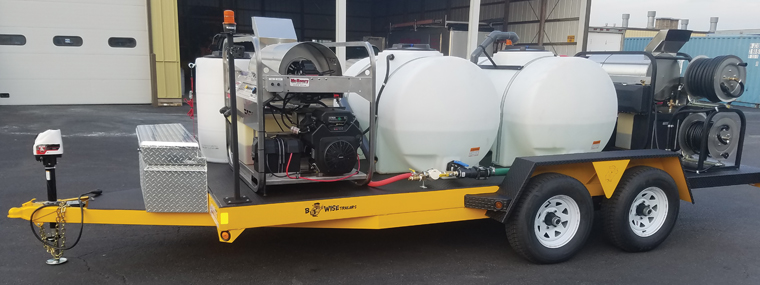
Trailers
Easy to Use and Reliable
By Diane M. Calabrese / Published June 2019

Selling Trailers
Older than the wheel? More than likely the first trailers are.
If it is dragged or pulled, it’s a trailer (though wheels are a great addition!).
From small carts that simplify moving a pressure washer around a job site to highway-compliant trailers that transport custom-made systems to their new owners, trailers play a significant role in our industry.
The regulations with which manufacturers of on-road trailers must comply are extensive. At its website at www.natm.com, the National Asso-ciation of Trailer Manufacturers in Topeka, KS, cites how it helps its more than 900 member companies comply with a sometimes seemingly “overwhelming” number of regulations and requirements.

Photos courtesy of Ultimate Washer.
NATM members participate in a mandatory compliance verification program to earn permission to place a NATM compliance decal on their products. The decal provides an easy way to ascertain the fundamental safety requirements (e.g., lights, capacity limits, brakes) are built into the conveyance.
Distributors who sell trailers provide a great service to customers. Not only do they enable end users to buy equipment and a means to transport the equipment at a single location, but they also assist the end user by asking important questions.
A contractor new to trailers will benefit from help in getting the trailer that’s the best fit. Even an experienced contractor gains by talking with a dealer who can point to new options and improvements.
The distributor selling trailers must encourage the prospective buyer to begin with the basics. Start with the “what” of it all.
“What do they want to haul on the trailer?” says Dennis Black, president of McHenry Pressure Cleaning Systems Inc. in Frederick, MD. “What type of machine and quantity of pressure washers? How much water do you want to haul? What accessories—hose reels, surface cleaners, soap storage, tool boxes, ladder racks, etc.—do you want to carry?”
Yet that is just the start. From there, a distributor must find out whether the customer wants an enclosed or open trailer, as well as the type of vehicle that will be pulling the trailer, explains Black. He adds that the end user should be able to assess the type of customers most frequently served and the ease of access to those customers.
For the most part, Black says end users are making good use of trailers, from the smallest machine totes to road-worthy attachments. After all, pulling instead of lifting—as with a pressure washer on a caddie—conserves the energy of workers.
Water, though, causes Black some concern. “One of the biggest problems we see is the customer wants to haul too much water,” he explains. “Water is heavy and can be an unstable weight. We advise customers not to attempt to carry too much water—it’s too much weight, requires a larger pull vehicle, and is less efficient to transport.”

Photo courtesy of Dennis Black with McHenry Pressure Cleaning Systems.
An end user considering the addition of a trailer versus a second truck will want to factor in advantages built into a trailer. “The trailer is less of an investment than a truck,” says Black. “The customer can leave a trailer on a job site and use the tow vehicle for other things.”
Custom solutions might not be the first thing that comes to mind when thinking trailers, but customization is a significant component of the business of selling.
“We have had our market turn more towards custom trailers,” says Black. “We are able to give customers custom sizes, lengths, options, etc. We always try to point out that custom materials and finishes are important when setting up any mobile rig.
“Trailer surfaces are subjected to constant wet and corrosive elements,” continues Black. “Having a durable and resistant surface will prolong the life of the trailer and make it a better investment.”
Selling customized trailers is an extremely interesting niche, says Black. “We have built and provided trailers for a lot of interesting and out-of-the-ordinary applications.”
Fascinating?—Double That
“All the possible variations and configurations there could be” makes selling trailers truly interesting, says Kevin Netzer, general manager at Ultimate Washer Inc. in Riviera Beach, FL. “We always like custom builds for this reason. If you can wish, we can build it.”
Even the best dreams must be tempered by reality, however. “We definitely need to make sure the dream is not too big for their needs,” says Netzer. “We never oversell. We recommend what you can use with your vehicle and what you need for your application.”

Photo courtesy of Dennis Black with McHenry Pressure Cleaning Systems.
And that goes back to making the first choice: trailer or truck. “The biggest advantage of a vehicle trailer over a van or box truck is not to be confined or limited by space,” says Netzer. “You can always go higher or wider when working with a trailer layout.”
A trailer also gives a contractor the ability to use a personal vehicle or another vehicle for towing. If a core truck lands in the shop, it’s nice to know a trailer can be pulled with rental, for instance.
The flexibility a trailer affords is great. But regulations are in play at every juncture.
“One often overlooked item is that a trailer needs to be registered as a vehicle,” says Netzer. “You will need the title from the seller so you can register with the department of motor vehicles.”
[Know the rules that apply to trailers within a state and on interstate highways. For more on keeping track of all these rules, including Department of Transportation expectations, see the Cleaner Times (May 2016) article “Power Washer’s Guidebook: Keep Your Rig at Its Best” at www.cleanertimes.com/magazine/cleaner-times-articles-2/keep-rig-best).]
Remaining compliant with regulations is made easier when an end user gets off to a good start by being candid with the seller of a trailer. A seller should ask specifically about the towing capacity of the vehicle that will be used to pull the trailer, says Netzer.
“For example, if the customer is requesting to add a 500-gallon trailer to the rig’s setup, at a weight of eight pounds per gallon of water, this will represent 4,000 pounds of weight for water alone,” says Netzer. He emphasizes that only with realistic parameters can a seller make sure
the customer does not exceed the capacity of his vehicle.
Once the size of a trailer is established, Netzer and his team seek a firm understanding of a contractor’s work. “If they are using the trailer for cleaning large, flat surfaces like a parking area, we would suggest surface cleaners and water recovery and filtration systems to be compliant with EPA guidelines. We would also recommend a larger flow rate (gpm) to accommodate the surface cleaners. For this application, hot water will be advantageous for any grease and oil.”
Or, perhaps the customer will just be doing mobile detailing, says Netzer. In that case, the recommendation would be for cold water, lesser flow rate, smaller tank, and shorter wands (flexible for under wheel wells and undercarriages), he explains.

Photo courtesy of Dennis Black with McHenry Pressure Cleaning Systems.
Whichever type of cleaning will take place, once it is understood fully, an optimal configuration for the trailer can be made, explains Netzer. It also makes it possible for the seller to assist with concerns beyond choice of a trailer.
“A significant concern we hear from contractors is what to do with the exhaust from the hot water pressure system,” says Netzer. “We get into conversations with them about draft diverters and whether a vertical or horizontal burner is better.
“This, of course, depends on the configuration of the van or box truck and how many doors can be opened to vent the space,” continues Netzer. “We generally suggest hot water users have an open trailer.”
Equipment transported inside a truck is more easily secured from theft. But trailers compete well with trucks, even on curb appeal.
Netzer explains the contractors his team talks with very much want curb appeal. They want their equipment and ancillaries and vehicles to speak to their competence— and versatility in add-on services such as sewer jetting. Carrying a full complement of accessories serves as a good visible indicator of the range of offerings a contractor provides, if everything is arranged in a highly organized way.
“Clearly, if using a trailer, there will be a need for adequate space for all the accessories needed,” says Netzer. “Storage boxes, hanging racks, and space-efficient hose reels are all critical needs for securing and maximizing the utility of the trailer.”
Trailers may be as old as the first bundled reeds used to skid rocks. But static entities they are not. Manufactur-ers and distributors keep innovating.
Netzer’s company offers a 3000-psi hot water trailer that uses eight gpm. “This is very versatile for contractors who will use it for multiple applications while being very space efficient, so it is easy to maneuver in tight spaces,” he explains. “It incorporates a 200-gallon tank and dual hose reels, one for a low-pressure hose and one for a high-pressure hose. It has a V-twin gas engine that has an electric start. It is easy to use and reliable.”
Easy to use and reliable. These descriptors are music to the ears of contractors—and the happy notes that all sellers of trailers aim to strike.





